#terry and neil interview
Explore tagged Tumblr posts
Text


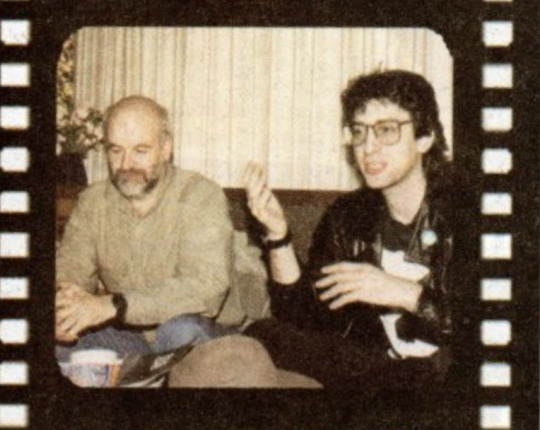







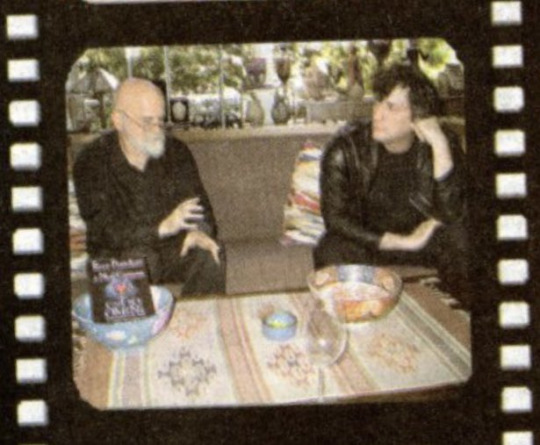

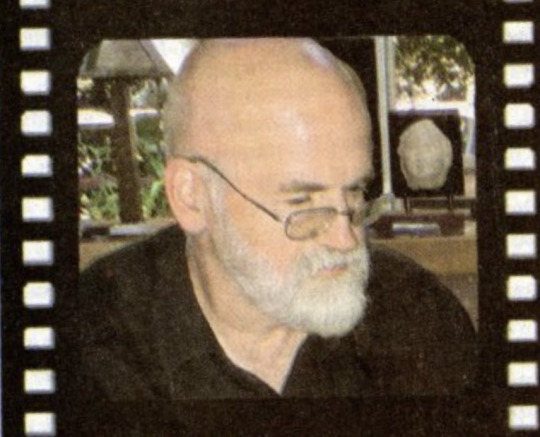



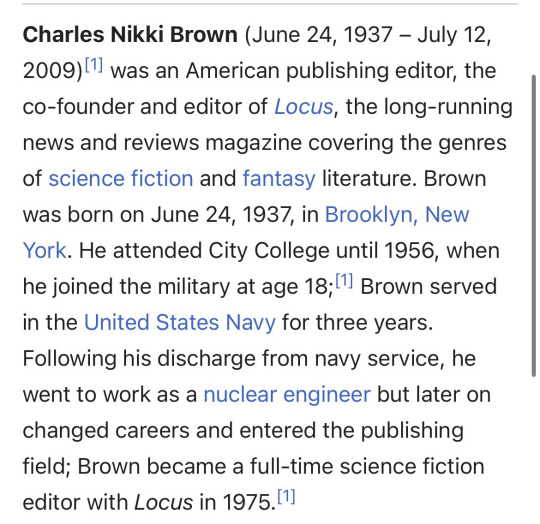
(trying to see what Neil has on his shirt in 1991... it's a skull isn't it? :D<3
@chrisondra-exists replied to your post “(trying to see what Neil has on his shirt in...”:
Pretty sure that's the Misfits band logo :D
ooh thank you! :D <3)
tweet
#good omens#terry pratchett#neil gaiman#charles n brown#interview#terry interview#neil interview#terry and neil interview#photos#terry and neil#btb#❤
7K notes
·
View notes
Text
Sir Terry Pratchett: on writing Good Omens with Neil Gaiman
I love the whole interview but this little snippet most of all:
Terry: “You can usually bet, and I’m sure Neil Gaiman would say the same thing, that, uh, if I go into a bookstore to do a signing and someone presents me with three books, the chances are that one of them is going to be a very battered copy of Good Omens; and it will smell as if it’s been dropped in parsnip soup or something in and it’s gone fluffy and crinkly around the edges and they’ll admit that it’s the fourth copy they’ve bought”.
You can never own enough Good Omens copies.
#good omens#terry pratchett#neil gaiman#crowley#aziraphale#ineffable husbands#good omens fun facts#good omens interviews#this place is lacking on Terry interviews#i will bring them here#parsnip#gnu terry pratchett
16K notes
·
View notes
Text
✨ hugely enticing ✨
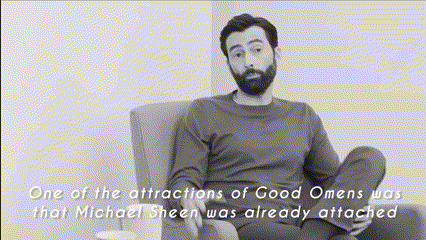


Source
#david tennant#michael sheen#good omens#good omens 2#crowley x aziraphale#aziracrow#ineffable husbands#aziraphale#crowley#neil gaiman#terry pratchett#david tennant interview
1K notes
·
View notes
Text
Look, if you want to support an LGBT-friendly piece of media that has elements of horror and fantasy (and that doesnt benefit a rapist) go watch Interview with the Vampire. There are queer characters who aren't - gasp! - all lily white British men and it's actually a way better and far more progressive show.
I promise you that gay characters exist out of Good Omens.
Oh and if you want good fantasy books just literally read anything by Terry Pratchett, who always had more talent in his little finger than Neil Gaiman's entire pretentious body.
#interview with the vampire#Neil gaiman#Good omens#Terry pratchett#Begging this insane fandom to grow up
163 notes
·
View notes
Text
Neil Gaiman does a podcast with David Tennant (2020)
The podcast is here, and there's a transcript of parts of it here. It's all really interesting!
Here's what really resonates for me. While talking about the opening flashbacks of s1e3 (emphasis is mine):
"Neil: It was utterly budget-busting and I also knew that it would make everything else work. And also it would make the scene I knew I was going to write in episode 3… it would turn that from a scene that was a bit sniffly into one that would break people’s hearts [yep, the bandstand scene], because you’d actually spent 28 minutes watching the ups and downs of these two on Earth for 6000 years becoming the only important thing in each other’s lives and here is this moment where there are actually… they have two utterly disparate philosophies of existing and Aziraphale cannot go off with Crowley and Crowley cannot leave without him but he has to, and you wind up with a ‘Have a nice doomsday’ line. But the excitement that I had of writing that stuff and the joy I had knowing that we’re going to watch the relationship open like a flower to us, ending in the 1960 with the hand-over of the holy water and there wouldn’t be a dry eye in the house - and I knew that because it did that for me - them watching what you and Michael brought to it and it became the most most glorious tentative friendship over thousands of years, that then becomes sort of peculiar and flirty and weird and prickly and funny and glorious, and, you know, it was the one that won me the Nebula Award."
This absolutely frames season 2 for me, and in particular the final fifteen minutes, which are season 2's heartbreaking bandstand scene. During season 2, we watched their relationship once again open like a glorious, flirty flower, still the only important thing in each other's lives, until their utterly disparate philosophies of existing separated them and broke all of our hearts.
But they came back together after the bandstand, and they will again after season 2 🤞❤️
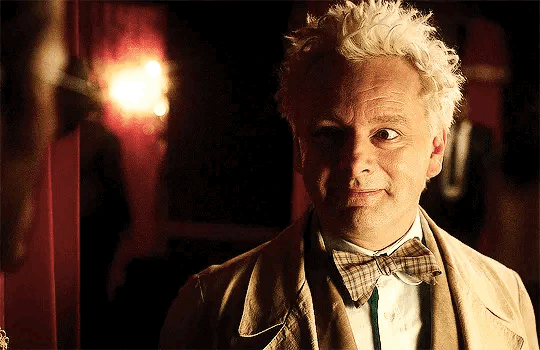
#david tennant#neil gaiman#good omens#good omens season 1#good omens season 2#Interview#podcast#good omens meta#aziraphale#crowley#good omens analysis#ineffable husbands#love#gnu terry pratchett#terry pratchett#final fifteen#good omens speculation#good omens bandstand#good omens season 3#ineffable lovers#ineffable fandom#ineffable divorce#ineffable idiots#ineffable spouses
227 notes
·
View notes
Text
Good Omens graphic novel interview.
7 Days left in the Kickstarter campaign.
866 notes
·
View notes
Text
I AM SO FUCKING EXCITED FOR S3 OMFG!!!!!
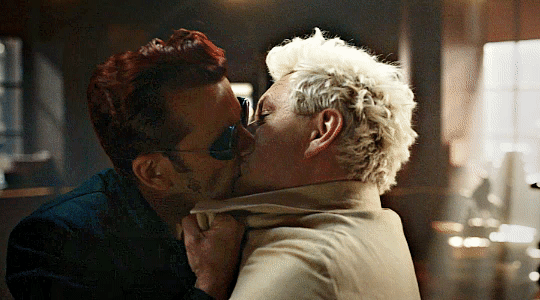
Hope they kiss properly and SAVE THE FUCKING WORLD!!!!!!
#good omens#aziracrow#aziraphale#crowley#ineffable husbands#neil gaiman#gomens#angel#gomens s2#prime video#good omens spoilers#good omens 2#gos3#good omens comic#good omens fanart#no nightingales#pls neil gaiman#neil interview#neil and terry#anthony j crowley#crowley x aziraphale#aziraphale x crowley
58 notes
·
View notes
Note
And it all started with a gay angel and demon.... I think that's beautiful
It all started with a demon named Crawleigh who got split into two people. And that is beautiful.
31 notes
·
View notes
Text
| | | | | | | | | | | | | | | | | |
Click the Read More for a list of tags commonly used on this blog.
| | | | | | | | | | | | | | | | | |
Anything related to Good Omens:
#good omens
Anything not related to Good Omens:
#not good omens
Cast & Crew tags:
#neil gaiman #david tennant #michael sheen #terry pratchett ...etc
Character tags:
#aziraphale #aj crowley #muriel #gabriel #beelzebub #nina #maggie #metatron ...etc
Content tags:
#fanart #fan comic #fanimation #fanimatic #gif #video #audio #fan edit
Ship tags:
#ineffable idiots (previously #ineffable husbands) #ineffable bureaucracy
Anything with fem!Aziraphale/Crowley:
#ineffable ladies
Anything pertaining to (Spoiler Alert) you-know-what in 2×06:
#ineffable divorce
Anything regarding the upcoming (though not for a long time now) Good Omens 3:
#good omens 3 #good omens 3 speculation
Anything regarding the upcoming Good Omens Graphic Novel on Kickstarter:
#good omens graphic novel
Some miscellaneous tags:
#interview #good omens bts #the bentley #angel crowley #snake eyes #snake crowley #behind the scenes #fire extinguisher #snakes #plants #good omens graphic novel #a nightingale sang in berkeley square ...etc
-------------------------------------------------------
For your convenience, this pinned post has been tagged with the majority of the aforementioned tags; Simply click on one of your choosing to search this blog for it.
-------------------------------------------------------
※ More tags will be added to this list later on.
| | | | | | | | | | | | | | | | | | |
#good omens#aj crowley#aziraphale#good omens 2#neil gaiman#ineffable husbands#ineffable idiots#ineffable bureaucracy#ineffable ladies#david tennant#michael sheen#terry pratchett#ineffable divorce#the bentley#angel crowley#interview#good omens bts#snake eyes#snake crowley#a nightingale sang in berkeley square#behind the scenes#good omens graphic novel#good omens 3#good omens 3 speculation
38 notes
·
View notes
Note
I tried to do a transcript of Sir Terry’s point of view on writing Good Omens. The 90% that Neil mentions, is also mentioned by Terry. I do recommend checking out that interview; it’s fascinating insight on the process of writing and everything else that comes along with it.
Hi Mr. Gaiman
My mother and I were wondering what the logistics are when two people write a book together?
Like for Good Omens, did you and Terry Pratchett take turns writing chapters or paragraphs? Did you proofread/edit each others additions to the book?
THANKS!
The way I remember it, I wrote 90% of the book and Terry wrote the other 90% of the book. We rewrote each other's stuff, but most of the work was done on long phone calls where we would plot what was going to happen next.
#good omens#neil gaiman#crowley#ineffable husbands#aziraphale#terry pratchett#sir terry pratchett#interview#good omens process
3K notes
·
View notes
Text
Terry Pratchett and Neil Gaiman at NADWCON 2011 (North American Discworld Convention) ❤
Neil: The single worst experience that we went through was, I think, the film. The first go round on the film, where it was bought by very nice people who convinced us they were very nice because we were absolute innocent. And I just remember going up for the first meeting with them.
And we were going up for the meeting, and Terry says, 'Here, come over here.'
I said, 'Okay.'
He said, 'Um, look, I'm not sure about these people, and you're not sure about these people. If this is our first meeting, if they're just completely barking, we should have a code word. And whoever says the code word, we both get up in unison and we leave'.
I said, 'Okay, so we need a code word that neither of us could conceivably say in normal conversation.'
And Terry says, 'Yes.'
I said, 'Okay, what about Biggles?' Now, Biggles, for those of you who don't know, was a famous...
Terry, joking: A famous Cardinal. [Cardinal Biggles in Monthy Python].
Neil: He was. Of course.
Terry: They're young, that's the only one they know.
Neil: Captain W. E. Johns wrote books about Biggles, who was a World War I flying ace who, with his pals Ginger and Algy used to go out and shoot out the evil Germans. So, if any Germans are here, you're not evil, it was just in this book. So. So, I say, 'What about Biggles?'
And Terry is, 'Okay. Biggles it is.'
So we head up for the meeting, and we're sitting there around the table talking to what seemed to be terribly nice, sensible people. And then the executive walks in. And the executive in this case was a woman who looked like she had mugged somebody 20 years younger than her and stolen her hair. And she walked in and she didn't... She said like, 'Hi, Neil. Hi, Terry. It's lovely to meet you both. Now, I'm sure that the guys have been talking to you about your book, Good Omens, and what we're thinking about now. Okay, let me just run some stuff past you. We figure the dynamics of this are the kid, Adam, whatever his name is, Newt, the witchfinder. We see him as, like, maybe being Tom Cruise, young, goodlooking, hunky, but he's looking for the witches. And the witch, Athaneema, I think her name was. Okay, so there's Newt and there's Athaneema'.
And I look at Terry, and I need to actually mime this - I think we should do this together.
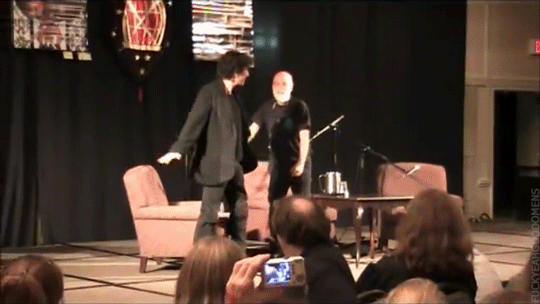
.
Fun fact: Neil wrote the 'Athaneema' into the Good Omens series :).
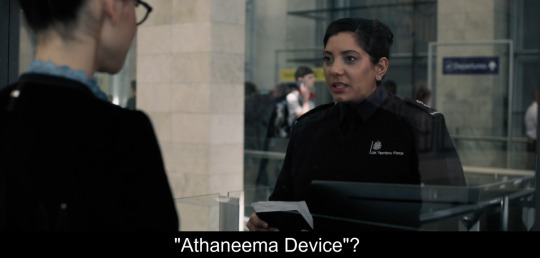
#good omens#terry pratchett#neil gaiman#terry and neil#interview#terry interview#neil interview#terry and neil interview#newt#anathema#athaneema#ep2#2i7#good omens movie#fun fact#videos#gointerviewedit#interview transcript#biggles#w e johns#transcripts
1K notes
·
View notes
Text
Another Sir Terry Pratchett interview on the details of writing Good Omens with Neil Gaiman. (More about this process x).
Question about how he goes about collaborating with someone else .
Terry: “You make them do what you want”.
Gary Cornell came up with something very apposite talking about working together, he says : It’s not that (each) of you does 50% of the work, each of you does 90% of the work.
Um. The way we did it then, and I can’t really speak as an expert because it's the only time I’ve ever done it and other people do it in different ways, it wasn’t a case of, the way the Americans tend to do it, um, is one person writes a draft and the other person goes in and noodles with that draft. We did the whole thing from the ground up; each was doing bits. The ad hoc way we had of working, it’s simple: I’ve got a track record writing novels, Neil hadn’t. So I became like the editor, the taskmaster. Because the other thing is the practical problem about two people 120 miles apart doing something, is that, um, it would be different now, but in those days we had no reliable means of electronic communication. We could connect computers together with modems and then spend the whole evening at cross purpose and ringing each other up and saying “I’m getting lots of little faces and shit like that all over..”
Three quarters of an hour and about eight phone calls, you actually managed to transmit about 2000 words you could have actually phoned and sneezed in a morse code.
[w]hen we were doing the first draft of the film script, we were both members of CompuServe so crappy our BT rural lines that the quick efficient way was for me to go into CompuServe and leave the work I’d done in Neil’s mailbox on the computer in Ohio or someplace and later that evening he would dial CompuServe in America and download it from Ohio or wherever it was.
So in order to get the script 120 miles, electronically it was doing about 10000. This is from the global village.
What we would do is I would hold the master copy and sometimes work would have to stop for 24 hours because stuff was in the post, because the nightmare, the absolute nightmare which I knew would happen if we let it, was that somehow we’d end up with two master copies in existence with little, minute changes, and we’d never be able to spot which was which.
So the last thing we wanted was two master copies, and we worked on the phone who did what. I did a bit more than Neil, of that anyway. But, it also felt to me to be an awful lot of the glue that no one wanted to do because it was easy to do set piece scenes and written on a kind of, on the kind of plot somewhere you get A and B to F and X and Y across to C T. And that really is like 3000 words where you have to move people around and then,you know, shove extra bits in; so I ended up probably doing near 75% of the book.
I would probably say because it’s, because had we’ve done it any other way it would’ve been like three months longer to do.
Also part of the process from another interview with Terry Pratchett:
Q: Let's talk a bit about the book you collaborated with Neil Gaiman on: Good Omens. That was before email, so how did it work on a practical basis? What was the most challenging aspect of writing with someone else?
I'm sure what I have to say will echo what Neil has said. When two people work on a book, it isn't a case where each one does 50% of the work. Each one does 100% of the work. There are some bits in Good Omens which I know are mine. There are some bits in Good Omens which I know are Neil's. There are some bits which were Neil's idea which I wrote, and there are some bits which were my idea which Neil wrote. Some bits we no longer know exactly whose ideas they were, or who wrote them. By the time we'd gone through all the drafts, it had been written by some sort of composite entity. We wrote it in the 14th century. We each had one phone line and a 1200 baud modem. We'd work it out: "OK, you send, I'll receive." Sometimes it would take 20 minutes to half an hour before we could send the stuff. It would have been cheaper and easier to have rung each other up and sneezed out the text in Morse Code. I was the Keeper of the Disks. I insisted that there should only be one official version in existence at any time. The moment it split into two, we would be in dead trouble. But Neil would sometimes send me a disk with 2000 words, saying " This is the scene with so and so -- insert it here." It more or less worked. It took us about six weeks to do the first draft. I think it worked because, at the time, we were each making a name for ourselves in our respective fields. It's not that we didn't take it seriously. But we were relaxed. We thought we would earn some holiday money by doing it. The nice thing about collaborating is that there is one other person in the world who is thinking about the exact same thing that you are thinking about. We both have a similar reading background, I suppose. It was quite rare when one of us came up with something that the other guy didn't know about. So we could bounce ideas off one another quite easily.
#good omens#crowley#terry pratchett#neil gaiman#aziraphale#ineffable husbands#good omens fun facts#good omens interviews#sir terry pratchett#this place is lacking on terry interviews
279 notes
·
View notes
Text
How Michael Met Neil
original direct link [MP3]
(Neil, if you see this, please feel free to grab the transcript and store on your site; I had no easy way of contacting you.)
DAVID TENNANT: Tell me about @neil-gaiman then, because he's in that category [previously: “such a profound effect on my life”] as well.
MICHAEL SHEEN: So this is what has brought us together.
DAVID: Yes.
MICHAEL: To the new love story for the 21st century.
DAVID: Exactly.
MICHAEL: So when I went to drama school, there was a guy called Gary Turner in my year. And within the first few weeks, we were doing something, having a drink or whatever. And he said to me, “Do you read comic books?”
And I said, “No.” I mean, this is … what … '88? '88, '89. So it was … now I know that it was a period of time that was a big change, transformation going through comic books. Rather than it being thought of as just superheroes and Batman and Superman, there was this whole new era of a generation of writers like Grant Morrison.
DAVID: The kids who'd grown up reading comic books were now making comic books
MICHAEL: Yeah, yeah, and starting to address different kinds of subjects through the comic book medium. So it wasn't about just superheroes, it was all kinds of stuff going on – really fascinating stuff. And I was totally unaware of this.
And so this guy Gary said to me, "Do you read them?" And I said, "No." And he went, "Right, okay, here's The Watchman [sic] by Alan Moore. Here's Swamp Thing. Here's Hellblazer. And here's Sandman.”
And Sandman was Neil Gaiman's big series that put his name on the map. And I read all those, and, just – I was blown away by all of them, but particularly the Sandman stories, because he was drawing on mythology, which was something I was really interested in, and fairy tales, folklore, and philosophy, and Shakespeare, and all kinds of stuff were being mixed up in this story. And I absolutely loved it.
So I became a big fan of Neil's, and started reading everything by him. And then fairly shortly after that, within six months to a year, Good Omens the book came out, which Neil wrote with Terry Pratchett. And so I got the book – because I was obviously a big fan of Neil's by this point – read it, loved it, then started reading Terry Pratchett’s stuff as well, because I didn't know his stuff before then – and then spent years and years and years just being a huge fan of both of them.
And then eventually when – I'd done films like the Underworld films and doing Twilight films. And I think it was one of the Twilight films, there was a lot of very snooty interviews that happened where people who considered themselves well above talking about things like Twilight were having to interview me … and, weirdly, coming at it from the attitude of 'clearly this is below you as well' … weirdly thinking I'm gonna go, 'Yeah, fucking Twilight.”
And I just used to go, "You know what? Some of the greatest writing of the last 50-100 years has happened in science fiction or fantasy." Philip K Dick is one of my favorite writers of all time. In fact, the production of Hamlet I did was mainly influenced by Philip K Dick. Ursula K. Le Guin and Asimov, and all these amazing people. And I talked about Neil as well. And so I went off on a bit of a rant in this interview.
Anyway, the interview came out about six months later, maybe. Knock on the door, open the door, delivery of a big box. That’s interesting. Open the box, there's a card at the top of the box. I open the card.
It says, From one fan to another, Neil Gaiman. And inside the box are first editions of Neil's stuff, and all kinds of interesting things by Neil. And he just sent this stuff.
DAVID: You'd never met him?
MICHAEL: Never met him. He'd read the interview, or someone had let him know about this interview where I'd sung his praises and stood up for him and the people who work within that sort of genre as being like …
And he just got in touch. We met up for the first time when he came to – I was in Los Angeles at the time, and he came to LA. And he said, "I'll take you for a meal."
I said, “All right.”
He said, "Do you want to go somewhere posh, or somewhere interesting?”
I said, "Let's go somewhere interesting."
He said, "Right, I'm going to take you to this restaurant called The Hump." And it's at Santa Monica Airport. And it's a sushi restaurant.
I was like, “Right, okay.” So I had a Mini at the time. And we get in my Mini and we drive off to Santa Monica Airport. And this restaurant was right on the tarmac, like, you could sit in the restaurant (there's nobody else there when we got there, we got there quite early) and you're watching the planes landing on Santa Monica Airport. It's extraordinary.
And the chef comes out and Neil says, "Just bring us whatever you want. Chef's choice."
So, I'd never really eaten sushi before. So we sit there; we had this incredible meal where they keep bringing these dishes out and they say, “This is [blah, blah, blah]. Just use a little bit of soy sauce or whatever.” You know, “This is eel. This is [blah].”
And then there was this one dish where they brought out and they didn't say what it was. It was like “mystery dish”, we had it ... delicious. Anyway, a few more people started coming into the restaurant as time went on.
And we're sort of getting near the end, and I said, "Neil, I can't eat anymore. I'm gonna have to stop now. This is great, but I can't eat–"
"Right, okay. We'll ask for the bill in a minute."
And then the door opens and some very official people come in. And it was the Feds. And the Feds came in, and we knew they were because they had jackets on that said they were part of the Federal Bureau of Whatever. And about six of them come in. Two of them go … one goes behind the counter, two go into the kitchen, one goes to the back. They've all got like guns on and stuff.
And me and Neil are like, "What on Earth is going on?"
And then eventually one guy goes, "Ladies and gentlemen, if you haven't ordered already, please leave. If you're still eating your meal, please finish up, pay your bill, leave."*
[* - delivered in a perfect American ‘serious law agent’ accent/impression]
And we were like, "Oh my God, are we poisoned? Is there some terrible thing that's happened?"
We'd finished, so we pay our bill. And then all the kitchen staff are brought out. And the head chef is there. The guy who's been bringing us this food. And he's in tears. And he says to Neil, "I'm so sorry." He apologizes to Neil. And we leave. We have no idea what happened.
DAVID: But you're assuming it's the mystery dish.
MICHAEL: Well, we're assuming that we can't be going to – we can't be – it can't be poisonous. You know what I mean? It can't be that there's terrible, terrible things.
So the next day was the Oscars, which is why Neil was in town. Because Coraline had been nominated for an Oscar. Best documentary that year was won by The Cove, which was by a team of people who had come across dolphins being killed, I think.
Turns out, what was happening at this restaurant was that they were having illegal endangered species flown in to the airport, and then being brought around the back of the restaurant into the kitchen.
We had eaten whale – endangered species whale. That was the mystery dish that they didn't say what it was.
And the team behind The Cove were behind this sting, and they took them down that night whilst we were there.
DAVID: That’s extraordinary.
MICHAEL: And we didn't find this out for months. So for months, me and Neil were like, "Have you worked anything out yet? Have you heard anything?"
"No, I haven't heard anything."
And then we heard that it was something to do with The Cove, and then we eventually found out that that restaurant, they were all arrested. The restaurant was shut down. And it was because of that. And we'd eaten whale that night.
DAVID: And that was your first meeting with Neil Gaiman.
MICHAEL: That was my first meeting. And also in the drive home that night from that restaurant, he said, and we were in my Mini, he said, "Have you found the secret compartment?"
I said, "What are you talking about?" It's such a Neil Gaiman thing to say.
DAVID: Isn't it?
MICHAEL: The secret compartment? Yeah. Each Mini has got a secret compartment. I said, "I had no idea." It's secret. And he pressed a little button and a thing opened up. And it was a secret compartment in my own car that Neil Gaiman showed me.
DAVID: Was there anything inside it?
MICHAEL: Yeah, there was a little man. And he jumped out and went, "Hello!" No, there was nothing in there. There was afterwards because I started putting...
DAVID: Sure. That's a very Neil Gaiman story. All of that is such a Neil Gaiman story.
MICHAEL: That's how it began. Yeah.
DAVID: And then he came to offer you the part in Good Omens.
MICHAEL: Yeah. Well, we became friends and we would whenever he was in town, we would meet up and yeah, and then eventually he started, he said, "You know, I'm working on an adaptation of Good Omens." And I can remember at one point Terry Gilliam was going to maybe make a film of it. And I remember being there with Neil and Terry when they were talking about it. And...
DAVID: Were you involved at that point?
MICHAEL: No, no, I wasn't involved. I just happened to have met up with Neil that day.
DAVID: Right.
MICHAEL: And then Terry Gilliam came along and they were chatting, that was the day they were talking about that or whatever.
And then eventually he sent me one of the scripts for an early draft of like the first episode of Good Omens. And he said – and we started talking about me being involved in it, doing it – he said, “Would you be interested?” I was like, "Yeah, of course." I went, "Oh my God." And he said, "Well, I'll send you the scripts when they come," and I would read them, and we'd talk about them a little bit. And so I was involved.
But it was always at that point with the idea, because he'd always said about playing Crowley in it. And so, as time went on, as I was reading the scripts, I was thinking, "I don't think I can play Crowley. I don't think I'm going to be able to do it." And I started to get a bit nervous because I thought, “I don't want to tell Neil that I don't think I can do this.” But I just felt like I don't think I can play Crowley.
DAVID: Of course you can [play Crowley?].
MICHAEL: Well, I just on a sort of, on a gut level, sometimes you have it on a gut level.
DAVID: Sure, sure.
MICHAEL: I can do this.
DAVID: Yeah.
MICHAEL: Or I can't do this. And I just thought, “You know what, this is not the part for me. The other part is better for me, I think. I think I can do that, I don't think I could do that.”
But I was scared to tell Neil because I thought, "Well, he wants me to play Crowley" – and then it turned out he had been feeling the same way as well. And he hadn't wanted to mention it to me, but he was like, "I think Michael should really play Aziraphale."
And neither of us would bring it up. And then eventually we did. And it was one of those things where you go, "Oh, thank God you said that. I feel exactly the same way." And then I think within a fairly short space of time, he said, “I think we've got … David Tennant … for Crowley.” And we both got very excited about that.
And then all these extraordinary people started to join in. And then, and then off we went.
DAVID: That's the other thing about Neil, he collects people, doesn't he? So he'll just go, “Oh, yeah, I've phoned up Frances McDormand, she's up for it.” Yeah. You're, what?
MICHAEL: “I emailed Jon Hamm.”
DAVID: Yeah.
MICHAEL: And yeah, and you realize how beloved he is and how beloved his work is. And I think we would both recognise that Good Omens is one of the most beloved of all of Neil's stuff.
DAVID: Yes.
MICHAEL: And had never been turned into anything.
DAVID: Yeah.
MICHAEL: And so the kind of responsibility of that, I mean, for me, for someone who has been a fan of him and a fan of the book for so long, I can empathize with all the fans out there who are like, “Oh, they better not fuck this up.”
DAVID: Yes.
MICHAEL: ��And this had better be good.” And I have that part of me. But then, of course, the other part of me is like, “But I'm the one who might be fucking it up.”
DAVID: Yeah.
MICHAEL: So I feel that responsibility as well.
DAVID: But we have Neil on site.
MICHAEL: Yes. Well, Neil being the showrunner …
DAVID: Yeah. I think it takes the curse off.
MICHAEL: … I think it made a massive difference, didn't it? Yeah. You feel like you're in safe hands.
DAVID: Well, we think. Not that the world has seen it yet.
MICHAEL (grimly): No, I know.
DAVID: But it was a -- it's been a -- it's been a joy to work with you on it. I can't wait for the world to see it.
MICHAEL: Oh my God. Oh, well, I mean, it's the only, I've done a few things where there are two people, it's a bit of a double act, like Frost-Nixon and The Queen, I suppose, in some ways. But, and I've done it, Amadeus or whatever.
This is the only thing I've done where I really don't think of it as “my character” or “my performance as that character”. I think of it totally as us.
DAVID: Yeah.
MICHAEL: The two of us.
DAVID: Yes.
MICHAEL: Like they, what I do is defined by what you do.
DAVID: Yeah.
MICHAEL: And that was such a joy to have that experience. And it made it so much easier in a way as well, I found, because you don't feel like you're on your own in it. Like it's totally us together doing this and the two characters totally complement each other. And the experience of doing it was just a real joy.
DAVID: Yeah. Well, I hope the world is as excited to see it as we are to talk about it, frankly.
MICHAEL: You know, there's, having talked about T.S. Eliot earlier, there's another bit from The Wasteland where there's a line which goes, These fragments I have shored against my ruin.
And this is how I think about life now. There is so much in life, no matter what your circumstances, no matter what, where you've got, what you've done, how much money you got, all that. Life's hard. I mean, you can, it can take you down at any point.
You have to find this stuff. You have to like find things that will, these fragments that you hold to yourself, they become like a liferaft, and especially as time goes on, I think, as I've got older, I've realized it is a thin line between surviving this life and going under.
And the things that keep you afloat are these fragments, these things that are meaningful to you and what's meaningful to you will be not-meaningful to someone else, you know. But whatever it is that matters to you, it doesn't matter what it was you were into when you were a teenager, a kid, it doesn't matter what it is. Go and find them, and find some way to hold them close to you.
Make it, go and get it. Because those are the things that keep you afloat. They really are. Like doing that with him or whatever it is, these are the fragments that have shored against my ruin. Absolutely.
DAVID: That's lovely. Michael, thank you so much.
MICHAEL: Thank you.
DAVID: For talking today and for being here.
MICHAEL: Oh, it's a pleasure. Thank you.
#neil gaiman#michael sheen#david tennant does a podcast with...#good omens#aziraphale#crowley#sushi#whale#the cove#oscars 2010#coraline#mini secret compartments#howneilmetmichael#howmichaelmetneil
5K notes
·
View notes
Text
The last time I saw you
We had just split in two
You was looking at me
I was looking at you
You had a way so familiar
But I could not recognize
'Cause you had blood in your face
And I had blood in my eyes
But I could swear by your expression
That the pain down in your soul
Was the same as the one down in mine
That's the pain
That cuts a straight line down through the heart
We call it love
So we wrapped our arms around each other
Trying to shove ourselves back together
We were making love
Making love
It was a cold dark evening such a long time ago
When by the might hand of Jove
It was a sad story how we became
Lonely two-legged creatures
It's the story
The origin of love
That's the origin of love
---
AND THEY WERE SOULMATES 😭😭😭





We've only really worked together since Good Omens 1. We did a movie together years and years and years ago and we're never in a scene together. So, that's where we first met. (X)
#good omens#good omens 2#interview#david tennant#michael sheen#soulmates#the origin of love#ineffable husbands#neil gaiman#gnu terry pratchett
4K notes
·
View notes
Text
The Final Fifteen is about Terry Pratchett's Death
read on Ao3
The final fifteen is obviously a major plot point, and serves a role in a story that was written long before Terry Pratchett was ever diagnosed with Alzheimer’s. But the scene itself wasn’t written until just a few years ago, during the writing of Season 2. In fact, the scene came about during a park bench conversation between Neil Gaiman and John Finnemore.
Others have noted that the non-romantic kiss that signals the story moving into the third act is a Neil Gaiman staple. The function of such a kiss, from Gaiman’s perspective, is to communicate.
In 2023 we are seeing a lot of stories written by men, for men, about men who are best friends and discover that their friendship can go deeper than the norms of society would usually allow; that platonic and romantic love are not so far apart, and perhaps the better word for a relationship that can be described this way is intimacy.
Neil Gaiman has made it clear in interviews that his friendship with Terry Pratchett was deeply intimate. They began collaborating on what would become Good Omens in the 1980’s, endured a tumultuous experience together through the first publication, wherein Neil offered to martyr himself on behalf of Terry if the book failed, and then spent the better part of two decades touring the world, meeting the people who loved their work. Neil would even off-handedly remark that Terry’s fans were so cheerful, and Neil’s seemed like they were ready to kill themselves; wouldn’t it be nice if they got married? From the outside, it looks very much as if Terry was Aziraphale-coded, and Neil was Crowley-coded, working together in an unexpected partnership to make the world a little bit more tolerable for the humans inhabiting it. I am not conjecturing that Neil and Terry had romantic inclinations the way their fictional characters do, but I think it is fair to say that their opposites-attract intimacy became an important part of who each of them were.
In 2007 Terry Pratchett was diagnosed with posterior cortical atrophy, a rare form of Alzheimer’s. As the disease progressed, he began to lose himself, and knew that the person he used to be was slipping away. He wanted to end his life on his own terms, and die as himself, but England did not and still does not allow for voluntary euthanasia or assisted suicide. He advocated for the right to die but never achieved it, and ultimately succumbed to the disease in 2015. Neil Gaiman has spoken a lot on the topic of death, and one answer of his that resonated with me reads:
Mostly it feels terrible. It even feels terrible when it’s someone who has been in a lot of pain for a long time or has not really been there for a long time and you know that Death has in some ways been a blessing: suddenly you are mourning the whole person.
It doesn’t get easier as you age. It gets stranger. The point where you realise how many people you used to know and like who aren’t there any longer, and you cannot talk to them or see them or laugh with them is painful in a way that I had never expected. The first time that someone you had a romantic relationship with dies and you realise that there had been moments both of you shared and now you are the sole custodian of those moments and one day you will be gone and they will be lost forever is peculiarly strange and hard.
~~~
The entire show is seeded with references to Terry Pratchett, but the most important one is the one that’s missing. Neil Gaiman cameoed as a sleeping moviegoer in S1E4, but a long time ago, he and Terry had discussed cameoing as sushi restaurant-goers, because sushi was weirdly prominent in the book. That cameo would have been in S1E1. But when it came time to do it, Neil couldn’t. Not without Terry.
Neil: I was gonna say our location is a Chinese restaurant we’d had turned into a sushi restaurant. So Terry and I, Terry Pratchett and I, had a standing… not even a standing joke, just a standing plan, that we were going to have sushi - there was going to be a scene in Good Omens where sushi was eaten and we were gonna be extras, we were gonna sit in the background, eating sushi while it was done. And I was so looking forward to this and, so I wrote this scene with it being sushi, even though Terry was gone, with that in mind and I thought: Oh, I’ll sit and I’ll eat lots of sushi as an extra, this will be my scene as an extra, I’ll just be in the background. And then, on the day, or a couple of days before, I realized that I couldn’t do it.
Douglas: You never told me this before either. I might have pushed you into doing it, had I known. I think you were right not to tell me.
Neil: I was keeping it to me self ‘cause I was always like: Oh, maybe I’ll be… this will be my cameo. And then I couldn’t. I was just so sad, ‘cause Terry wasn’t there. And it was probably the day that I missed Terry the most of all of the filming - it was just this one scene ‘cause it was written for Terry and all of the sushi meals we’d ever had and all of the strange way that sushi ran through Good Omens.
~~~
In the Final Fifteen, it is clear that Crowley and Aziraphale want to stay together. They love each other. They each know that the other loves them. There’s nothing that needs to be said, no convincing that their bond is true and real and precious.
But Aziraphale has to go to Heaven, and Crowley cannot follow him there.
I cannot speculate what it must have been like for Neil to endure losing a friend who, though I’m sure he desperately wanted to still be in his life, he also knew that life had become a burden to him, and grieved that Terry was not able to choose the time and manner of his departure from this Earth. This sort of complex grief, we fan-ficcers know, is the kind that is often best processed through story-telling.
I think that what we see Crowley going through in the Final Fifteen, alongside its importance to the story arc of Good Omens overall, is Neil processing his grief at losing his friend Terry Pratchett, and even the kiss, that violent, terrible, awful kiss, was the symbolic representation of Neil saying goodbye.
#neil gaiman#terry pratchett#aziraphale#crowley#good omens#good omens 2#good omens meta#ivoc#this meta ended up being only about 2/3 the length of my usual metas and somehow that feels appropriate because Terry's life ended too soon#and the jarring brevity of this piece parallels that feeling of sudden unexpected loss#for me anyways I don't know about you guys#if this made your eyes even slightly moist you are obligated to reblog to help someone else feel their feels#I don’t make the rules#but them is the rules#blessed by Beelzebub
895 notes
·
View notes
Text
Why Good Omens season 1 has already fulfilled Sir Terry Pratchett's wish
Neil Gaiman said he wouldn't make a sequel to Good Omens
Neil Gaiman at SXSW in Austin, Texas in 2019:

[Gaiman also confirmed the series will only be six episodes, with no intention of trying to go for another season if successful. "The lovely thing about Good Omens is it has a beginning, it has a middle, and it has an end," he said to appreciative applause. "Season 1 of Good Omens is Good Omens. It's brilliant. It finishes. You have six episodes and we're done. We won't try to build in all these things to try to let it continue indefinitely."]
Source: Entertainment Weekly (2019)
2018 - Neil Gaiman on X- Twitter

Tweet link here

Also Neil Gaiman in 2023:

["It won't be confirmed unless enough people watch Season 2 to make Amazon happy...
...But obviously Season 3 is all planned and plotted and, if I get to make it, will take the story and the people in it we care about to a satisfying end."]
What happened?
Were the profits and ratings high enough to create two more seasons out of thin air? At this point, seasons 2 and 3 seem more like a greedy stretching of a beloved story already told in its entirety in the first season.
Has the first season already fulfilled Sir Terry Pratchett's wish?
As read above, Neil Gaiman himself said: "Season 1 of Good Omens is Good Omens."
Gaiman was very opened about how pleased he was with Season 1 and how he made it having Sir Terry Pratchett's wish in mind.
Interview for The Verge (May 30, 2019)
Link : Neil Gaiman had one rule for the Good Omens adaptation: making Terry Pratchett happy
Interviewer: Do you feel pressure from knowing this has to be the definitive best adaptation it could be?
Gaiman: No. All I wanted to do was to make something Terry would have liked. It wasn’t like, “Make the best thing.”...
...Gaiman: The lovely thing about Good Omens [the miniseries] is that it’s still Good Omens. If you loved the book, this is that thing that you loved. And I will make you fall in love even more with Sergeant Shadwell. I will make you fall even more in love with Newt than you thought you could, I hope. It does demonstrate that I do kind of know what I’m talking about, which is a nice thing to know.
...Gaiman: So with Good Omens, I feel like what I got to do was put the thing I made with Terry on the screen and then buttress it. What I added isn’t completely different from the original. It’s not out of left field.
Neil Gaiman on an interview for The Guardian in 2019.
Link: Neil Gaiman: ‘Good Omens feels more apt now than it did 30 years ago’
There are times, he insists, when “you make something you like so much that you don’t really care what anyone else thinks of it.” There’s a clue to this, perhaps, in the show’s final frame, which reads “For Terry”. “He didn’t believe in heaven or hell or anything like that,” Gaiman says, “so there wasn’t even a hope that there was a ghostly Terry around to watch it. He would have been grumpy if there was. But I made it for him.”
Why was Good Omens season 1 so good and you could really feel Sir Terry Pratchett's contributions?
Gaiman himself has already told us the answer:
...Gaiman: So with Good Omens, I feel like what I got to do was put the thing I made with Terry on the screen and then buttress it. What I added isn’t completely different from the original. It’s not out of left field.
Neil Gaiman for The Verge (2019).
There was original material to work with (Good Omens, published in 1990), on which we certainly know that Sir Terry Pratchett himself actively worked from start to finish.
Is there a proper sequel to Good Omens the book on which to base 2 more seasons of the series?
Neil Gaiman says the following on an interview for GQ in 2019.
Link: Neil Gaiman Says No to Adapting His Own Books—Except This Time
...But with this, it was like: Okay. Terry is gone. He wanted me to do this. He wanted me to do it for him. And that gave me a kind of weird impetus. And it meant that I felt very much at liberty to take every conversation that Terry and I had ever had about Good Omens. Not just the book, as written, but everything beyond it. We planned a sequel, never written, so I got to steal the angels from the sequel. I got to steal from every conversation Terry and I had about how we would do this. It felt very personal, and I guess kind of… holy. If that doesn’t sound too ridiculous. But it was a mission.
Two conclusions can be drawn:
1) Informal conversations about the plot of a sequel do not equate to an officially written sequel.
2) Neil Gaiman has already used many of the ideas he and Terry Pratchett had planned for a never-written sequel to Good Omens and those ideas were largely added to and executed in the TV adaptation of Good Omens (2019).
Why keep stretching those ideas if the co-writer is no longer able to actively contribute and help to create a proper sequel?
If Gaiman were the sole creator of Good Omens we'd have a different conversation, but that's not the case. The first season of Good Omens was already a beautiful homage to Good Omens and Sir Terry Pratchett's work on the book.
Did Terry Pratchett write around 75% of Good Omens?

Link for the post here.


Link for the post talking about the video and sharing the video here.
Edit: I wanted to bring this point up to point out Terry Pratchett's important contribution to the making of the book, not to highlight it as an excuse to distance Gaiman from the novel. We will have to accept that he also contributed to the creation of the book.
Sir Terry Pratchett's last wish
2017 - Rob Wilkins on Twitter (X)

Terry Pratchett’s Unpublished Work Crushed by Steamroller
By Sophie Haigney - The New York Times
Terry Pratchett, the well-known British fantasy author, had a wish fulfilled two years after his death: A hard drive containing his unpublished work was destroyed by steamroller.
Mr. Pratchett, a wildly popular fantasy novelist who wrote more than 70 books, including the “Discworld” series, died at 66 in 2015. That year his friend, the writer Neil Gaiman, told The Times of London that Mr. Pratchett had wanted “whatever he was working on at the time of his death to be taken out along with his computers, to be put in the middle of a road and for a steamroller to steamroll over them all.” Mr. Gaiman added at the time that he was glad this hadn’t happened.
Now, though, it has. Mr. Pratchett’s estate manager and close friend, Rob Wilkins, posted a picture of a hard drive and a steamroller on Aug. 25 on an official Twitter account they shared.
Shortly thereafter, Mr. Wilkins wrote that the deed was done.

I have not been able to find the exact reasons why Sir Terry Pratchet wanted his unfinished and unpublished works destroyed, but we can respect his last wish as a way for him to have control over what he felt he was ready to share with the world and what he was not.
Is Good Omens the exception?
With all that has been presented so far, I can only conjecture, but not be sure. I can believe that there was Terry Pratchett's permission and desire to make an adaptation of Good Omens, the original book published in 1990, but to my mind, creating two more seasons of a never-written sequel doesn't fit as part of Terry Pratchett's desire.
He is not among us to actively participate in a sequel and if his last wish was to destroy his unfinished works, I can't believe that he would have wanted to give his approval to something new published under his name and without his supervision.
Sir Terry Pratchett talking about a never-written sequel to Good Omens
“Neil and I thought about a sequel an awful lot initially. We talked about it on tour. And I think it was a big relief to both of us, when one day we looked one another in the eye and said, 'I thought you wanted to do a sequel.'..
Interview for the Magazine Locus. Locusmag archive page
This is me speculating, but I don't think there was real enthusiasm for creating a sequel until Gaiman alone saw profitable potential in the TV adaptation....
Good Omens also belongs to the those who love the story
I think it's okay to still love the story of Good Omens. Personally, I will always be grateful with the story and the characters for giving me confort in troubling times, but I find seasons 2 and 3 as some kind of excuse from Gaiman to keep profiting and benefiting from the story (more now than ever due to the SA allegations*).
Aziraphale and Crowley will always live happily in a lovely cottage as long as we want to. Even before season 2 was announced, many of us had already accepted that. Many artists have imagined lovely endings for our innefable husbands and in my eyes their works won't be any less valuable than whatever Gaiman had planned.
Note:
I don't like talking about Season 3 of GO without mentioning the current SA allegations against Neil Gaiman (Main writer of seasons 2 and 3 and showrunner), so in case you want to know more about the allegations against Neil Gaiman. Here there's a great Round Up link (Podcasts links, transcripts, etc.)
Credits for the Round Up link to Muccamukk. Thanks a lot!
*more thoughts on supporting season 3
#good omens#there's not a formal written sequel#seasons 2 and 3 shouldn't exist#good omens season 3#good omens season 2#good omens book#book omens#aziraphale#crowley#aziracrow#neil gaiman is not a good person#good omens fandom#good omens prime#terry pratchett#good omens 2#good omens 3#aziraphale book#crowley book#ineffable fandom#ineffable husbands#aziraphale x crowley#neil gaiman#fire neil gaiman
138 notes
·
View notes